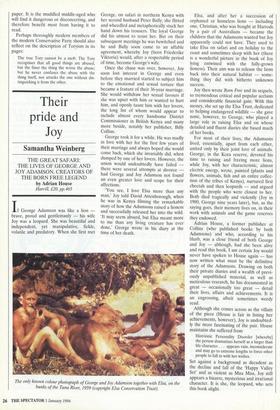Keeping the jungle at bay
John Patten
THE COMMONPLACE BOOK OF MONSIGNOR A. N. GILBEY Libri £13.95, pp. 192 The phrase 'living treasure' might have been invented for Mgr A. N. Gilbey; he would certainly have been given the Order of the Great Chrysanthemum or whatever had he lived his life in Japan; instead, he comes from Essex and is Apostolic Protonotary to His Holiness the Pope, a little-known honour, but one, I suppose, which might be thought of as a baronetcy with knobs on in British secular circles.
He is very holy, very wise, and very old. All these qualities are there in the photo- graph by Lord Snowdon on the dust jacket
of his Commonplace Book, though the hands gripping the umbrella look discon- certingly like those of a talented strangler.
He is very important in the history of Roman Catholicism, and of the social development of our country throughout most of the century in which he has lived. To understand why, frustratingly enough, you have to listen to him (always very diffi- cult because of the low volume and high speed at which he talks), or read those
things which others have transcribed from his teachings. Most notable of these is his remarkable teaching on the Catechism in We Believe (1983).
It is a pity he has never cared much for prose, and his attitude to anything needing to be written was summed up by one he loved, the late Dominican Fr Paul Foster in the title of the biography which that priest always threatened to write, 'The Life and Letter of Alfred Gilbey'.
It is a truism to say that Mgr Gilbey doesn't care much for change; he hates the
inessential as well, a feeling brilliantly caught in the words of his address given to a group of Catholic graduates at Oxford in 1968, when even the Eternal City was riven with riot in that year of student unrest:
On a recent visit to Lourdes, I was taken by an enthusiastic friend to a concelebrated High Mass under the Basilica which I had not previously seen. As we emerged, he eagerly asked me what impression the cere- mony had made on me. 'It reminds me,' I replied, 'of nothing so much as a Nazi rally.' He was shocked until he appreciated that I was referring, of course, not to the content or the purpose of the ceremony itself, but to its inessential trappings — the vast crowd, the raised central stage, the slow and impressive procession of half a dozen bishops and more than 20 priests advancing on the spotlit altar.
(We Believe, p.257)
He wished to have this new collection of his favourite and to him essential readings brought together in a commonplace book called 'Keeping the Jungle at Bay'. Not using that title seems to me to be the only lapse on the part of the publishers who should otherwise be congratulated on this contemporary jewel.
The need to keep back the tendrils is the unifying theme of this collection. The jun- gle is undoubtedly egalitarianism, the assumption is that all men and women are not equal, and that if they strive to make each other so, it will produce worse evils than those they are trying to abolish. Egali- tarianism, as he told me, `starts by killing the home'. It is quite clear that family and home are seen as the cement of the way in which we should live now, and used to live then; indeed, the very family is not egalitar- ian, but itself is based on hierarchy, as the source of love, power and education is the parent and not the state.
There are lessons, even for Secretaries of State for Education, if you are prepared to rootle through its pages like an old badger. But what it really all means is not written down but frustratingly remains sometimes elusive. George Saintsbury's Scrap Book hints at it, published in 1922 .How right the
Professor was when he opined:
One prepares oneself to hear nonsense whenever the word 'right' is uttered.
He goes on to say that a child has
as much and as little right to a good educa- tion as he has to a good horse, a good yacht or a good dukedom.
To Mgr Gilbey, believing that there is a surplus of academics, it is better to have education there for those 'able to profit by it'. Those whose incessant lobbying in the Palace of Westminster or on the airwaves of the Today programme for subsidies 'to deal with crises' could do no better than contemplate Saintsbury on the fact that `Expediency can fail no capital Right'.
For some a legitimate question might be 'What is the point of him?' The point of Mgr Gilbey is not just his holiness and his longevity, his clothing and his conversation, but the fact that he understands the nature of human society, the importance of family and its structure. It is also that he stayed true, without flinching, to these values when most were throwing them off the hack of the sledge.
He spans the generations and has that extraordinary quality of being able to inspire and understand the young; they flock to his feet. The Spectator could do no better than offer a complimentary copy of this Commonplace Book as an inducement or bribe to everyone still in their teens to take out an annual subscription to the
paper. It is the muddled middle-aged who will find it dangerous or disconcerting, and therefore benefit most from having it to read.
Perhaps thoroughly modern members of the modern Conservative Party should also reflect on the description of Toryism in its pages:
The true Tory cannot be a snob. The Tory recognises that all good things are abused, but the finer the thing the worse the abuse; but he never confuses the abuse with the thing itself, nor attacks the one without dis- tinguishing it from the other.











































 Previous page
Previous page